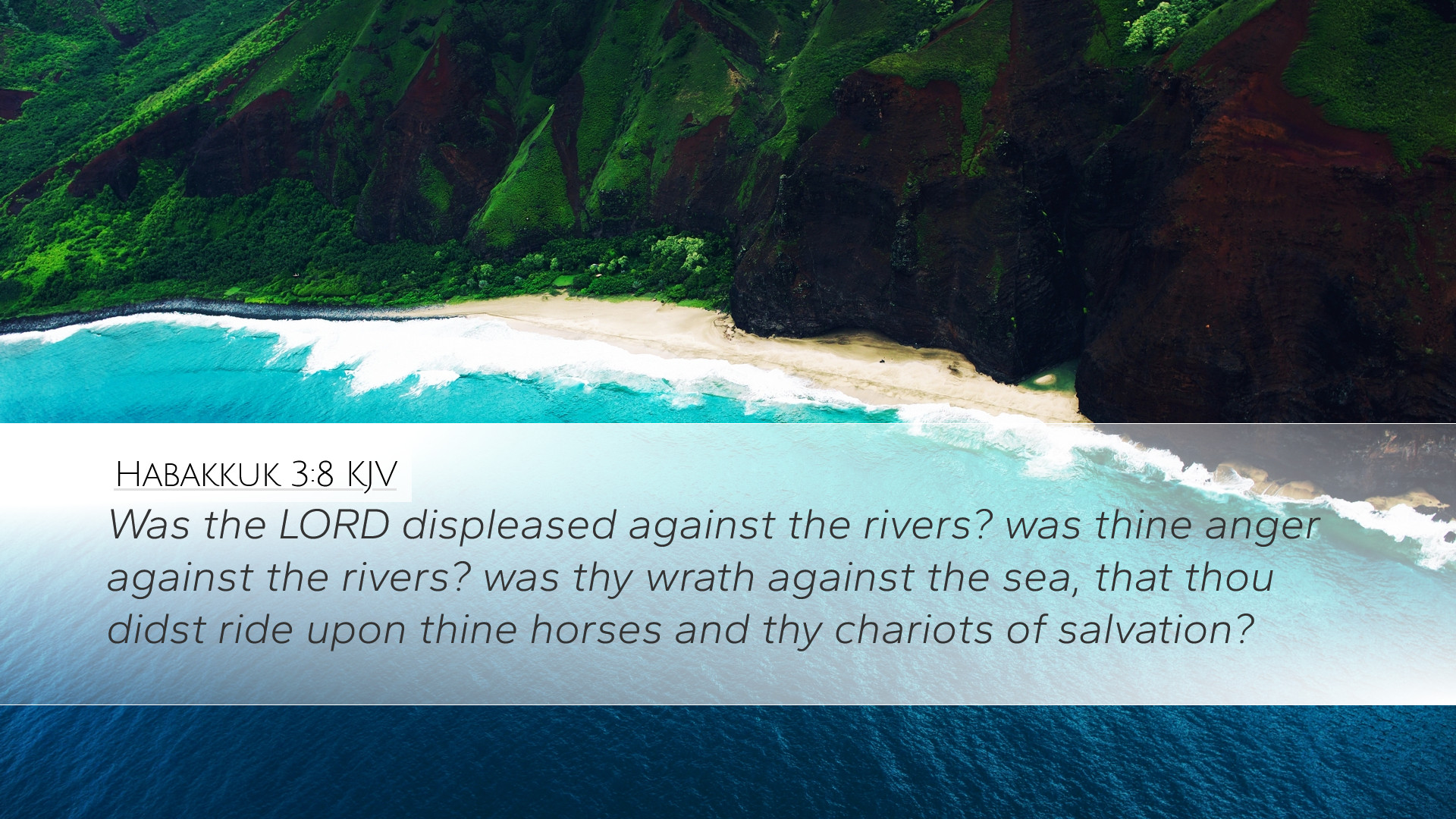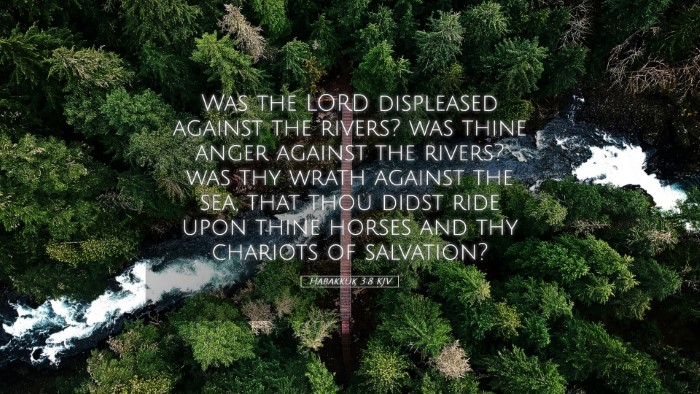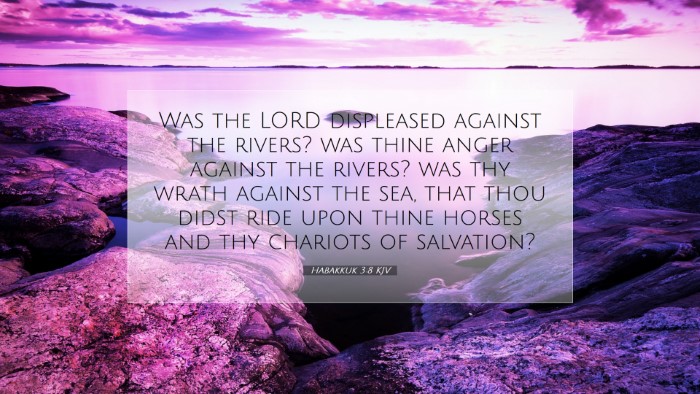Old Testament
Genesis Exodus Leviticus Numbers Deuteronomy Joshua Judges Ruth 1 Samuel 2 Samuel 1 Kings 2 Kings 1 Chronicles 2 Chronicles Ezra Nehemiah Esther Job Psalms Proverbs Ecclesiastes Song of Solomon Isaiah Jeremiah Lamentations Ezekiel Daniel Hosea Joel Amos Obadiah Jonah Micah Nahum Habakkuk Zephaniah Haggai Zechariah MalachiHabakkuk 3:8
Habakkuk 3:8 KJV
Was the LORD displeased against the rivers? was thine anger against the rivers? was thy wrath against the sea, that thou didst ride upon thine horses and thy chariots of salvation?
Habakkuk 3:8 Bible Commentary
Commentary on Habakkuk 3:8
Habakkuk 3:8 states: "Was the Lord displeased against the rivers? was thine anger against the rivers? was thy wrath against the sea, that thou didst ride upon thine horses and thy chariots of salvation?" This verse raises profound theological questions about the nature of God's relationship with creation, His justice, and His deliverance. The eminent commentators Matthew Henry, Adam Clarke, and Albert Barnes provide rich insights and interpretations of this pivotal text.
Contextual Background
The context of Habakkuk's prophecy is crucial to understanding this verse. Just prior to this passage, Habakkuk expresses his distress over the apparent injustice and suffering in the world. This leads him to question God's ways and timing. The prophet questions God's silence in the face of evil and makes a heartfelt appeal for understanding and deliverance.
Exegesis of the Verse
Examining the verse closely, we note that Habakkuk is personifying nature, asking whether God’s anger is directed toward inanimate elements like rivers and seas. According to Matthew Henry, this rhetorical inquiry illustrates that God's actions in the world can seem incomprehensible from a human perspective. God’s 'riding upon horses and chariots' symbolizes His might and sovereignty over creation, suggesting a divine intervention in human affairs that transcends earthly powers.
Adam Clarke emphasizes that the use of the word "wrath" indicates a severe judgment from God. He interprets the rhetorical questions as a form of lamentation, reflecting Habakkuk's deep concern for the land's natural elements, which bear the brunt of divine judgment. Clarke posits that the prophet recognizes not just the physical destruction but the spiritual implications of God’s actions, showing that everything in the created order is subjected to His will.
Albert Barnes elaborates on the theological significance of the imagery found in this verse. He suggests that God's intervention in history is often accompanied by natural phenomena, thus connecting divine action with the created order. The 'horses and chariots of salvation' symbolize God's triumphant rescue of His people. Barnes notes that Habakkuk acknowledges God's control over all aspects of life, including nature itself, reflecting a profound understanding of God’s omnipotence.
Theological Implications
This verse invites readers to contemplate divine sovereignty and justice. The questions Habakkuk poses can resonate with those who grapple with suffering and injustice in their lives and communities. It calls for an understanding that God's actions may not always align with human expectations.
- Sovereignty of God: Habakkuk recognizes that God’s power extends beyond the spiritual realm into the natural world, illustrating His complete control and authority.
- Nature and Judgment: The natural world is portrayed as a participant in God’s redemptive plan, serving either as an instrument of judgment or salvation.
- Divine Intervention: The depiction of God riding forth suggests active engagement in human history, affirming that He is not passive but rather a dynamic force within the world.
Practical Applications
For pastors, theologians, and students of the Bible, Habakkuk 3:8 offers several practical applications:
- Encouragement in Suffering: This text reassures believers that God is aware of their struggles and that He ultimately exercises sovereignty over circumstances.
- Understanding Natural Disasters: It challenges the faithful to contemplate how natural events may serve divine purposes, pushing for theological reflection on suffering and order.
- Faith in Action: The confidence expressed by Habakkuk in God's power to save empowers believers to actively engage in their communities, advocating for justice amid adversity.
Conclusion
In summary, Habakkuk 3:8 encapsulates critical themes of divine sovereignty, mercy, and justice that resonate throughout the scripture. It provokes thought regarding God’s relationship with creation and His purpose in allowing suffering. By engaging with the insights of Matthew Henry, Adam Clarke, and Albert Barnes, we gain a robust understanding of the text that challenges, encourages, and equips believers to trust in God's ultimate plan, despite the chaos of the world around them.


